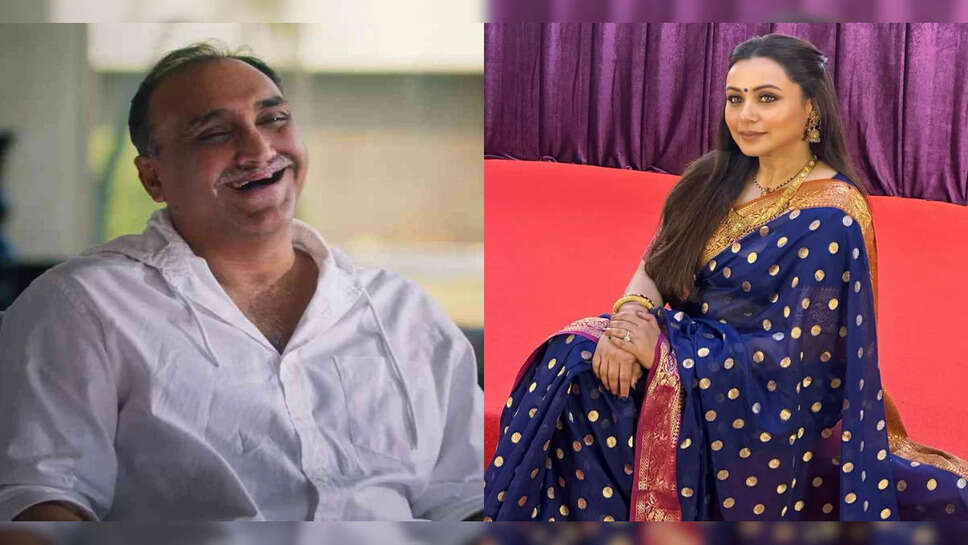When Aditya Chopra Walked Out of Home for Love: The Rani Mukerji Chapter

In the glittering world of Bollywood, where fairy tales are often scripted for the screen, Aditya Chopra and Rani Mukerji’s love story reads like a classic tale of conviction, resistance, and quiet endurance. But behind the success of their relationship lies a lesser-known chapter of emotional turbulence, familial resistance, and one man's determination to follow his heart — even if it meant stepping away from his own home.
While much has been said about their relationship today — stable, private, and drama-free — few recall that it all began with controversy, speculation, and a deeply personal standoff within one of India’s most revered film families.
The Beginning: A Bond Beyond the Screen
Aditya Chopra, the intensely private filmmaker and head of Yash Raj Films, met Rani Mukerji on multiple professional occasions during the early 2000s. From Mujhse Dosti Karoge! to Veer-Zaara, Rani was fast becoming a favourite at the production house, and whispers of a romance began surfacing as Aditya’s own marriage with his first wife, Payal Khanna, hit troubled waters.
At first, the media labeled it as mere gossip. But soon, the tension turned real, especially after Aditya filed for divorce — a move that sparked speculation and sparked family discomfort, particularly given the conservative reputation of the Chopra household.
‘She Does Not Like Rani Much…’ — Family Opposition Surfaces
As per accounts from insiders and those close to the family, Aditya’s mother, Pamela Chopra, was uncomfortable with the idea of Rani entering the family — not due to any personal vendetta, but reportedly because she still had deep emotional ties to Aditya's first marriage.
An oft-repeated quote, anonymously attributed to a close associate, encapsulates the situation:
“She does not like Rani much, but she will eventually come around. Adi has made up his mind.”
The discomfort within the family reached a point where Aditya Chopra left his family home and checked into a hotel for several months — not as a rebellion, but as a silent stand for the woman he had chosen. It wasn’t about theatrics or public statements. In true Aditya fashion, it was a quiet yet firm move.
Choosing Love After Divorce in a Traditional Society
Divorce in India — especially within prominent families — is often treated with discomfort. The added complexity of quickly entering a new relationship or contemplating remarriage often becomes a source of friction, not just socially but within families.
In Aditya Chopra’s case, his decision to move on and be with Rani invited public scrutiny and personal sacrifice. For a man who rarely speaks or even appears in public, to take such a drastic personal step reflected a profound commitment.
The Long Road to Acceptance
It wasn’t overnight that things changed. Rani, too, reportedly faced intense judgment, being unfairly labeled the "other woman" for years — despite no proof of wrongdoing on her part. She chose to stay silent, allowing time to heal wounds and let perceptions shift organically.
Their relationship — kept almost entirely away from paparazzi lenses — matured away from public gaze. There were no joint appearances, no social media displays of affection, and certainly no official confirmations until they tied the knot in 2014 in a quiet ceremony in Italy, away from both media and the glamour of Bollywood.
By then, acceptance had found its way into the Chopra household, albeit gradually. Aditya and Rani, now married for over a decade, share a daughter and a life that continues to value privacy over popularity.
Expert Insight: Love After Divorce Is Not a Rebellion — It’s Growth
Relationship experts often highlight how divorce is not the end of love — it is a redirection. Dr. Swati Mehra, a Mumbai-based psychologist specializing in post-divorce counseling, says:
“Aditya Chopra’s story reflects a reality many divorced individuals face — societal pressure to remain alone, family resistance to moving on, and the guilt attached to loving again. But choosing to love again is not rebellion; it is growth. It is healing.”
According to her, what makes Aditya’s story compelling is the emotional courage involved. He didn’t just divorce a partner — he walked away from the safe, structured approval of his family to follow something more uncertain but real.
The Rani Mukerji Perspective: Grace Amidst Judgment
While Aditya bore the weight of familial rejection, Rani Mukerji navigated a different kind of pressure — that of public perception. For a woman already under the lens as one of the industry’s top actresses, being branded as the reason for a marriage ending came with its own emotional toll.
Rani never addressed the controversies directly — a choice that many viewed as dignified. Years later, she opened up subtly, saying:
“Love and commitment are deeply personal. The world can say what it wants, but you know your truth, and that’s what matters.”
Today, Rani stands as not just a celebrated actress but a woman who endured judgment without compromise — and found a partner who supported her through it all.
Love Stories That Don’t Follow Scripts
Aditya Chopra and Rani Mukerji’s story doesn’t follow the traditional Bollywood love arc. There were no public proposals, no romantic interviews, and no grand declarations. Instead, their love was quiet, persistent, and willing to pay the price of acceptance.
Whether it was Aditya’s hotel stay, or Rani’s silence in the face of criticism, their choices reflected emotional maturity, not defiance.
The Real Test of Love
In the end, real love often isn’t about fireworks — it’s about standing by each other when the lights are off, when the world disapproves, and when even family fails to understand.
Aditya Chopra’s choice to momentarily walk away from his family home wasn’t an act of rebellion — it was a step toward building a life of authenticity, trust, and emotional clarity.
In doing so, he not only redefined what it means to love after divorce but also proved that true commitment doesn’t require validation — just courage.
